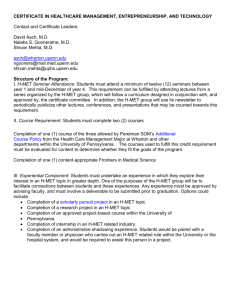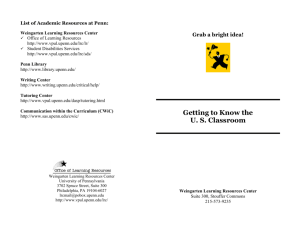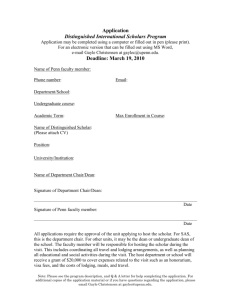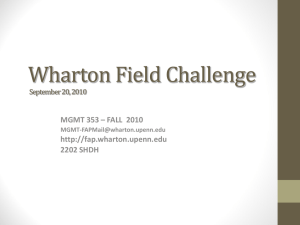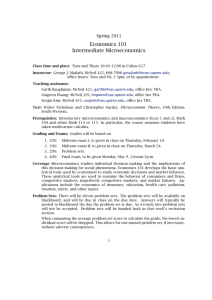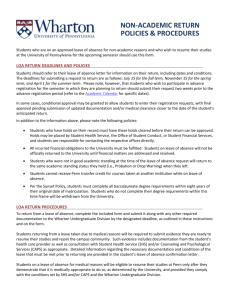Sustainability at Penn01 Mar 23
advertisement
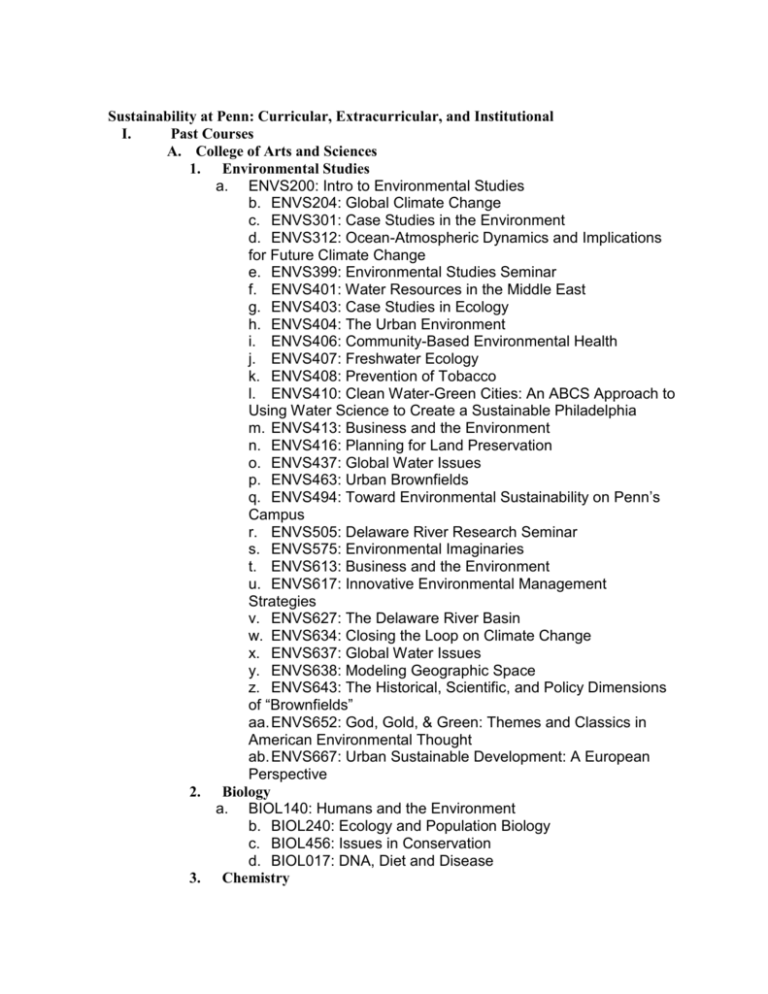
Sustainability at Penn: Curricular, Extracurricular, and Institutional I. Past Courses A. College of Arts and Sciences 1. Environmental Studies a. ENVS200: Intro to Environmental Studies b. ENVS204: Global Climate Change c. ENVS301: Case Studies in the Environment d. ENVS312: Ocean-Atmospheric Dynamics and Implications for Future Climate Change e. ENVS399: Environmental Studies Seminar f. ENVS401: Water Resources in the Middle East g. ENVS403: Case Studies in Ecology h. ENVS404: The Urban Environment i. ENVS406: Community-Based Environmental Health j. ENVS407: Freshwater Ecology k. ENVS408: Prevention of Tobacco l. ENVS410: Clean Water-Green Cities: An ABCS Approach to Using Water Science to Create a Sustainable Philadelphia m. ENVS413: Business and the Environment n. ENVS416: Planning for Land Preservation o. ENVS437: Global Water Issues p. ENVS463: Urban Brownfields q. ENVS494: Toward Environmental Sustainability on Penn’s Campus r. ENVS505: Delaware River Research Seminar s. ENVS575: Environmental Imaginaries t. ENVS613: Business and the Environment u. ENVS617: Innovative Environmental Management Strategies v. ENVS627: The Delaware River Basin w. ENVS634: Closing the Loop on Climate Change x. ENVS637: Global Water Issues y. ENVS638: Modeling Geographic Space z. ENVS643: The Historical, Scientific, and Policy Dimensions of “Brownfields” aa. ENVS652: God, Gold, & Green: Themes and Classics in American Environmental Thought ab. ENVS667: Urban Sustainable Development: A European Perspective 2. Biology a. BIOL140: Humans and the Environment b. BIOL240: Ecology and Population Biology c. BIOL456: Issues in Conservation d. BIOL017: DNA, Diet and Disease 3. Chemistry a. CHEM012: Environmental Chemistry 4. Geology a. GEOL100: Intro to Geology b. GEOL109: Intro to Geotechnical Science c. GEOL401: Environmental Geology d. GEOL421: Elemental Cycling in Global Systems e. GEOL503: Earth Systems and Earth Hazards f. GEOL511: Geology of Soils g. GEOL545: Earth Surface Processes h. GEOL618: Fundamentals of Air Pollution i. GEOL645: Mineral Resources and the Environment 5. Education a. EDUC/ENVS421: Teaching Science in Elementary and Middle Schools b. EDUC605: Sustainability in Schools 6. Communications a. COMM300: Public Space, Public Life 7. History a. HIST321: Environmental History Seminar 8. Political Science a. PSCI136: Urban Politics in the US b. PSCI135: Politics of Food c. PSCI335: Healthy Schools Seminar 9. Science, Technology and Society a. STSC179: Environmental History Seminar 10. Sociology a. SOCI111: Health of Populations b. SOCI553: Field Methods of Social Research: Doing Ethnographic Research 11. Urban Studies a. URBS205: Intro to Environmental Design b. URBS206: Public Environment of Cities: Intro to the Urban Landscape c. URBS312: Health in Urban Communities (Health and Societies) B. School of Engineering and Applied Sciences 1. Chemical and Bimolecular Engineering a. CBE375: Engineering and the Environment 2. Electrical and Systems Engineering a. ESE400: Engineering Economics b. ESE351: Logistics, Manufacturing, and Transportation c. ESE360: Intro to Environmental Systems d. ESE555: Cities and Transportation Systems 3. Engineering and Applied Sciences a. EAS401: Energy and Its Impacts: Technology, Ecology, Economics and Sustainability b. EAS402: Renewable Energy and Its Impacts 4. Mechanical Engineering and Applied Mechanics a. MEAM250: Energy Systems, Resources and Technology C. Wharton 1. Legal Studies a. LGST215: Environmental Law and Business b. LGST815: Environmental Management Law and Policy c. LGST220: International Business Ethics 2. Operations and Information Management a. OPIM261: Risk Analysis and Environmental Management 3. Business and Public Policy a. BPUB261: Risk Analysis and Environmental Management b. BPUB294: Cross-Benefit Analysis c. BPUB772: Urban Public Policy and Private Economic Development 4. Insurance and Risk Management a. INSR205: Risk Management 5. Government Administration a. GAFL725: Development Projects in Cities b. GAFL761: Government Relations c. GAFL569: Politics of Housing and Urban Development d. GAFL532: Big City Politics: How to Pass Municipal Legislation e. GAFL528: Marketing for Non-Profits and Governments f. GAFL722: Budgeting and Finance Management for Public and Nonprofit Entitie 6. Organizational Dynamics a. DYNM634: Process Improvement Tool Seminar b. DYNM667: Systems Thinking Seminar 7. Real Estate a. REAL215: Urban Real Estate Economics 8. Economics a. ECON327: Urban Fiscal Policy 9. Finance a. FNCE215: Urban Real Estate Economics D. Nursing 1. Nursing a. NURS054: Principles of Human Nutrition b. NURS315: Sociocultural Influences on Health c. NURS516: International Nutrition: Political Economy of World Hunger d. NURS513: Obesity and Society e. NURS340: Nursing in the Community: Theory II. f. NURS823: Designing Interventions to Promote Health and Reduce Health Disparities 2. Organizational Dynamics of Healthcare Systems a. DYNM667: Complexity, Sustainability, and Systems Thinking b. DYNM603: Administrative Decision Making and Problem Solving c. NURS650: Health Systems Analysis d. NURS748: Leadership Development for Health 3. Public Health a. PUBH530: Environmental Toxicology: Risk Assessment and Health Effects E. School of Design 1. Landscape Architecture a. LARP760: Topics in Ecological Design: Green Roof Systems b. LARP770: Topics in Ecological Design: Large-Scale Landscape Reclamation Projec c. LARP780: Topics in Theory and Design: Case Studies in Urban Design Lecture d. LARP780: Topics in Theory and Design: Landscape and Globalization: Reproducibility and Environmentalisms 2. City Planning a. CPLN621: Food Systems Lecture b. CPLN509: Law and Urban Development c. CPLN540: Intro to City Planning: Past, Present, Future 3. Architecture a. ARCH734: Architecture and Ecology b. ARCH756: Sustainable Urban Forms c. ARCH343: Environmental Systems d. ARCH812: Field Research F. Law 1. Law a. LAW540: International Climate Change b. LAW777: Environmental Lawyering c. CPLN509: Law and Urban Development d. ENVS611: Environmental Law Fall 2010 Courses A. College of Arts and Sciences 1. Architecture a. ARCH255: Sustainability in Action 2. Environmental Studies a. ENVS400: Saving Our Estuaries: Resources, Regulations and Recovery b. ENVS305: Bioremediation c. ENVS404: Urban Environment: West Philadelphia d. ENVS494: Toward Sustainability on Penn's Campus e. ENVS612: Economics and the Environment f. ENVS533: Research Methods in Environmental Studies g. ENVS620: How to Quantify Sustainable Practices in Business and Manufacturing h. ENVS631: Current EPA Regulatory Practices and Future Directions i. ENVS611: Environmental Law j. ENVS204: Global Climate Change k. ENVS664: Sustainable Design 3. Urban Studies a. URBS290: Metropolitan Nature b. URBS420: Perspectives on Urban Poverty c. URBS452: Community Economic Development d. URBS404: Philanthropy and the City e. URBS451: Politics of Housing and Urban Development f. URBS457: Globalization and Comparative Urban Development 4. Biology a. BIOL414: Advanced Biology b. BIOL440: Advanced Analysis of Humans and the Environment B. School of Engineering and Applied Sciences 1. Mechanical Engineering and Applied Mechanics a. MEAM250: Energy Systems, Resources and Technology b. MEAM402: Energy Engineering 2. Engineering and Applied Sciences a. EAS401: Energy and Its Impacts C. Wharton 1. Organizational Dynamics a. DYNM674: Capitalism and Sustainability b. DYNM619: Organizational Project Management 2. Legal Studies a. LGST806: Negotiation and Conflict Resolution 3. Government Administration a. GAFL722: Budgeting and Finance Management for Public and Nonprofit Entities b. GAFL528: Marketing for Non-Profits and Governments c. GAFL532: Big City Politics: How to Pass Municipal Legislation d. GAFL569: Politics of Housing and Urban Development e. GAFL761: Government Relations 4. Insurance and Risk Management a. INSR805: Risk Management 5. Real Estate a. REAL730: Urban Fiscal Policy b. REAL772: Urban Public Policy and Private Development D. School of Design 1. III. Architecture a. ARCH751: Ecology, Technology, and Design 2. City Planning a. CPLN530: Intro to Land Use b. CPLN531: Intro to Planning and Policy c. CPLN641: Green Development d. CPLN550: Intro to Transportation Planning e. CPLN677: Land Conservation Finance 3. Landscape Architecture a. LARP750: Building New Urban Landscapes, Planting Design and Construction E. Law School 1. LAW a. LAW540: International Climate Change b. LAW686: Natural Resources Law c. LAW777: Environmental Lawyering F. Nursing 1. Nursing a. NURS513: Obesity and Society b. NURS521: Current Topics in Nutrition 2. Public Health a. PUBH500: Intro to Public Health b. PUBH530: Environmental and Occupational Health Extracurricular A. Penn Environmental Group (PEG) http://www.dolphin.upenn.edu/pennenv/ Directors: Christina Dietzen, cdietzen@sas.upenn.edu and Zachary Bell, zacharyabell@gmail.com On-Campus contact: Abby Waldorf, awaldorf@sas.upenn.edu Off-Campus contact: Max Cohen, maxacohen@gmail.com B. PennScience Journal of Undergraduate Research (Multidisciplinary undergraduate research journal published by the Science and Technology Wing at UPenn) http://www.pennscience.org/index.php/journal/index Co-Editor In Chief: Vishesh Agrawal Email: vishesha@sas.upenn.edu C. PennGreen Pre-orientation Program http://www.vpul.upenn.edu/osl/preprog/pgdesc.html PennGreen provides students with an environmental introduction to Penn and Philadelphia, and offers them a chance to form relationships with peers interested in environmental activism. During the program, participants will meet faculty, learn about campus recycling and LEED building projects, work at a local urban farm, partake in and learn about how the community participates in the sustainable food and living movement, embark on an educational river tour, and more. In addition, students will have a great time D. E. F. G. H. I. J. K. L. getting to know Penn, Philadelphia, and like-minded students before NSO begins. Earth and Environmental Studies Undergraduate Advisory Board (EESUAB) (Peer advising, information on classes, professors, sub-matriculating, etc) http://www.dolphin.upenn.edu/eesuab/ Contact: eesuab@gmail.com Penn Vegetarian Society http://www.dolphin.upenn.edu/pennveg/index.html (plans and implements awareness/peer education campaigns and academic/social events that relate to our three main areas of concern: personal health, environmental issues, and animal ethics) FarmEcology at Penn http://www.upenn.edu/ccp/FarmEcology/ (student-initiated endeavor that is raising awareness and educating Penn's campus about the benefits of local foods) Eco-Reps Program (Penn Green Campus Partnership) http://www.upenn.edu/sustainability/eco-reps.html (Peer-to-peer educational program designed to help students in Penn's college houses reduce their environmental footprint through improved environmental awareness and behavior changes) CommuniTech http://fling.seas.upenn.edu/~ctech/cgi-bin/index.php (Student organization in the School of Engineering & Applied Sciences that aims to assist neighborhoods in need by supplying them with computers and teaching technology skills to their residents) Undergraduate Assembly (UA) http://pennua.org/ (Represent undergraduate interests to the administration, faculty, and all other constituent groups - work on sustainability initiatives such as off campus recycling and socially responsible investing) Graduate and Professional Student Assembly (GASPA) http://www.gapsa.upenn.edu/ (Government for graduate and professional students, interacting regularly with the President, Provost, Board of Trustees, and other University officials - part of Penn's Environmental Sustainability Advisory Committee) Environmental Sustainability Advisory Committee http://www.upenn.edu/sustainability/our_history.html (Cross-campus collaboration that included a representative group of faculty, staff, and students to advise the President on environmental sustainability issues) IGEL: Initiative for Global Environmental Leadership http://environment.wharton.upenn.edu/ (Penn/Wharton faculty, in consultation with business, NGO, and government representatives - discuss and research selected topics concerning business and the natural environment) M. Wharton Energy Network http://www.whartonenergy.com/index.html (Alumni club focused on alumni involved, or interested, in the cleantech and energy industries) N. Wharton Energy Club http://www.whartonenergyclub.com/ (Hub for energy interest at The Wharton School - enhances recruiting into the energy industry and hope to establish Wharton as a thought leader in the sector) O. College Houses and Academic Services (CHAS) http://www.collegehouses.upenn.edu/index.asp (provide supportive residential communities for the education of undergraduate students: PennMoves (annual move-out re-use drive), hand out compact fluorescent light bulbs, etc) P. Penn Engineering Student Activities Council (ESAC) http://fling.seas.upenn.edu/~esac/wiki/ (Group oversees all student groups at Penn Engineering) Q. Environmental Planning and Ecological Design Club (EPED) http://www.design.upenn.edu/current-students/student-groups-andorganizations (Student group that engages with community and peers in a cross-disciplinary exploration of policy and design solutions to environmental challenges - raises awareness and inspire action toward economic, social, and ecological sustainability) R. Penn Design Student Council http://www.design.upenn.edu/student_council/index.html S. Penn Institute for Urban Research http://www.upenn.edu/penniur/about.shtml (Dedicated to fostering increased understanding of cities and developing new knowledge bases that will be vital in charting the course of local national and international urbanization) T. Penn Cartographic Modeling Lab http://cml.upenn.edu/ (Geographic Information Systems technology) IV. Institutional A. Penn Dining Services http://www.cafebonappetit.com/penn/ (Bon Appetit, Recyclemania, etc) B. Green Campus Partnership http://www.upenn.edu/sustainability/index.html (Dedicated to promoting a sustainable culture and implementing environmentally-conscious policies) Contact: sustainability@upenn.edu C. Facilities and Real Estate Services http://www.facilities.upenn.edu/index.php "Sustainable Practices" (Energy Management, Waste and Recycling, Collaborative Efforts, Built Environment) D. Barbara and Edward Netter Center for Community Partnerships http://www.upenn.edu/ccp/index.php (Supports Academically-Based Community Service Classes - aims to bring about community improvement, including in schools and neighborhoods, while using problem-oriented research and teaching and service learning, to emphasize student and faculty reflection on the service experience) E. Department of Earth and Environmental Studies http://www.sas.upenn.edu/earth/index.html -Undergraduate Program: http://www.sas.upenn.edu/earth/u_progs.html -Institute for Environmental Studies (faculty): http://www.sas.upenn.edu/earth/ies.html -Masters in Environmental Studies (MES): http://www.sas.upenn.edu/lps/graduate/mes/ -Masters of Science in Applied Geosciences (MSAG): http://www.sas.upenn.edu/lps/graduate/msag/ F. UCGreen http://www.ucgreen.org/ (Promote, coordinate, and support volunteer community greening in University City, West/Southwest Philadelphia neighborhoods - build community, endorse sustainable practices, and champion environmental stewardship) G. PennPraxis http://www.design.upenn.edu/pennpraxis/ (Faculty and students - test ideas and apply theories through practical projects) V. ARCH255: Sustainability In Action A. Lecture Topics 1. Introduction to course design and intent 2. Concept of Sustainability: Definitions and Debates 3. Practice of Sustainability: Greenworks Philadelphia 4. System Capacity: Global Environment 5. System Capacity: Local Environment 6. System Capacity: Global Equity 7. System Capacity: Local Equity 8. System Capacity: Global Economy 9. System Capacity: Local Economy 10. Carrying Capacity: Energy Management 11. Carrying Capacity: Human Settlements 12. Carrying Capacity: Policy Formation B. Recitations 1. Residential Energy Efficiency in University City 2. Energy Strategy for Business in University City 3. Green Buildings and Innovation 4. Institutional Tree Planting Campaign 5. Tree Planting Outreach to Neighborhoods 6. Urban Agriculture in High Schools 7. Community Attitudes on Sustainability 8. Managing Water in West Philadelphia 9. Expanding Neighborhood Recycling (Reducing Waste, Empowering Communities) 10. Green Transportation Alternatives

